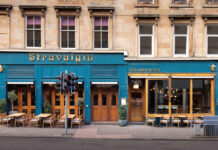First minister considers level 4 restrictions to take advantage of furlough extension

THE Scottish Government’s ‘levels’ system of COVID-19 restrictions came into force at 6am today (November 2), imposing different trading conditions on licensed premises across Scotland.
The system’s introduction came as it was announced that England will go back into a full lockdown for at least four weeks from this Thursday (November 5).
First minister Nicola Sturgeon said at her media briefing today that she was considering implementing the highest level of restrictions in areas of Scotland in order to reduce infection rates and take advantage of the extended furlough scheme from Westminster, which has been continued throughout November to cover the lockdown in England.
There are five levels of restrictions under the Scottish system, ranging from level zero to level four.
At zero, normal licensing times apply, with venues having to adhere to COVID-19 measures such as social distancing and increased hygiene regulations.
Level one requires venues to shut at 10.30pm and in level two alcohol can only be sold indoors with a main meal, with indoor areas having to shut at 8pm. Outdoor areas can sell alcohol as normal and can remain open until 10.30pm.
In level three, premises can open indoor and outdoor areas until 6pm for the sale of food and non-alcoholic drinks only. Regulations published on Friday (October 30) stated that premises without “the facilities to provide the definition of a ‘main meal’” should remain closed in levels two and three. More information on that is included below.
At level four premises are required to close.
The Scottish Government has now updated the FAQ section of its Tourism and Hospitality Sector Guidance to include information on the new system.
Exerts include:
Wet-only pubs
Q: Are premises that ordinarily only serve drinks (wet-bars) required to close by law?
A: If a premises does not have the facilities to provide the definition of a ‘main meal’ then they are required to close by law in levels two and three and can access the appropriate support for closed premises.
Alcohol with a main meal
Q: What constitutes a main meal?
A: A main meal would typically be something more than a mere snack – such as a plated meal, usually (though not necessarily) eaten with cutlery, and could include a substantial filled sandwich or panini served with a side such as salad or chips, or a ‘soup and a sandwich’ style meal, as well as other more substantial meals which may have more than one course.
Q: What facilities do I need to meet the requirement to provide a ‘main meal’?
A: In order to provide bar meals you would need to have this activity (or “restaurant facilities”) within the operating plan of your premises licence. Your business premises would also have to be currently registered as a food business under the Food Hygiene Act 1990, and have appropriate certificates in place to cover kitchen or food preparation facilities.
Q: Can I serve as many drinks as a customer wishes during and after a main meal?
A: Licensing law confirms that the traditional drink served at the beginning, whilst waiting on the meal itself, is treated as part of the meal, along with drinks served whilst the meal is consumed, and within reason, some consumption (eg. finishing a bottle of wine, or the taking of a postprandial digestif) after the consumption of the meal has concluded.
Q: After the customer has consumed their meal can they stay continue to order drinks?
A: Apart from reasonable finishing off (ie. the remains of a bottle of wine) or the taking of a postprandial digestif there should be no further service of alcohol.
Q: Does the customer have to consume the main meal?
A: There may be genuine reasons why someone may not be able to finish the majority of a main meal that they have ordered, but there should be no attempt to frustrate the intention of the rules with the aim of making the consumption of alcohol the primary activity. It should be obvious to premises if services are not being used appropriately for meal service.
Q: Do all individuals have to purchase a main meal to be permitted to buy alcohol or can one person per table?
A: The service of alcohol is secondary to the service of a main meal. The service of alcohol should not be offered to anyone who has not ordered food.
Hotels and travel
Q: Can I take new accommodation bookings?
A: You should only take new bookings that are in line with the travel restrictions. In level zero, one and two this means that you can take bookings from guests coming from areas that are in the same levels. In level three you should only take bookings from those within your own area. In level four visitor accommodation is closed. There are exceptions for essential purposes, e.g. work, which allow accommodation to open in level four and travel between level zero, one and two, and levels three and four.
Q: I am an accommodation provider. I have forward bookings. What about these?
A: Where a booking is no longer in line with travel advice we continue to expect the industry to abide by the standards of good practice we have seen so far through the pandemic, and follow the CMA guidance with regard to refunds, cancellations, and rescheduling. In line with CMA guidance, a full refund should be offered to customers who booked holiday homes but could not stay in them due to lockdown restrictions. The Scottish Government recognises the difficult position that many holiday companies will find themselves in at present. The regulation of consumer protection is the responsibility of the UK Government at Westminster. The Competition and Markets Authority have issued guidance to businesses and consumers about refunds.
Local authority levels:
Level Four
No council area
Level Three
Inverclyde
East Dunbartonshire
West Dunbartonshire
East Renfrewshire
Renfrewshire
Glasgow
South Ayrshire
East Ayrshire
North Ayrshire
Stirling
Falkirk
Clackmannanshire
Edinburgh
Midlothian
West Lothian
East Lothian
Dundee
North Lanarkshire
South Lanarkshire
Level Two
Aberdeenshire
Aberdeen
Fife
Borders
Dumfries & Galloway
Argyll & Bute
Perth & Kinross
Angus
Level One
Highland
Moray
Western Isles
Orkney
Shetland
Level Zero
No council area




















